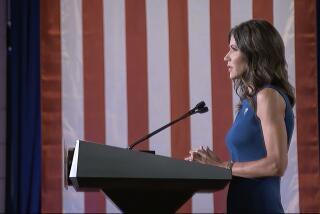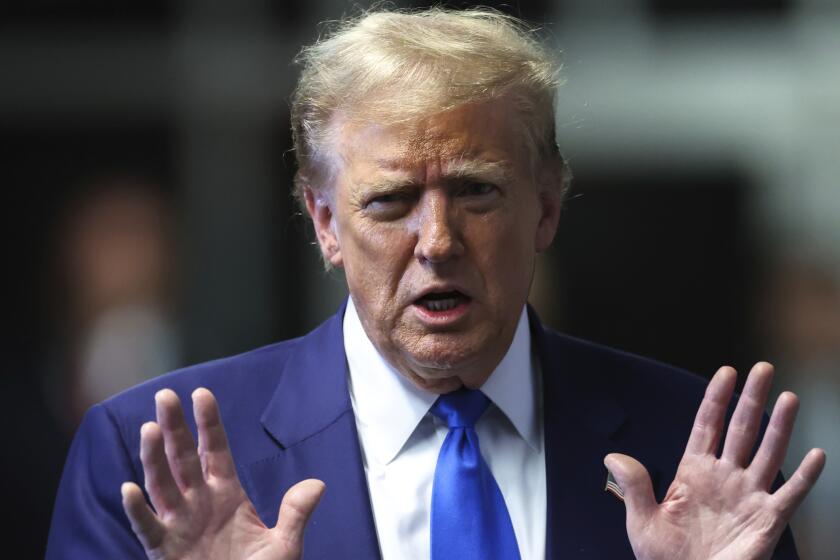Panel to Subpoena Poindexter to Explain Curbs on Data
A House subcommittee voted Wednesday to subpoena former National Security Adviser John M. Poindexter after he refused an invitation to testify about a directive he once issued restricting public access to unclassified information stored in computers.
On a unanimous voice vote, the panel agreed to subpoena Poindexter and his former assistant, Kenneth B. DeGraffenreid, to appear March 4 and explain why the White House gave the Pentagon authority to limit the flow of information that the military deemed “sensitive,” including scientific, economic and cultural data.
Members of the subcommittee want to question the men about the White House policy issued in October that ostensibly is aimed at keeping information stored in computers out of the hands of foreign governments such as the Soviet Union.
Fears Military Influence
The directive applies not only to classified information but also to unclassified data already in the public domain that has become readily available through computer data bases.
“These actions represent an unprecedented expansion of the military’s influence into our society, which is unhealthy and potentially dangerous,” said Rep. Jack Brooks (D-Tex.), chairman of the House Government Operations subcommittee on national security.
”. . . We must also rein in those national security officials who have used the program as a means to implement a new form of government censorship,” he added.
Poindexter, a central figure in the Iran- contra arms scandal, also refused last December to testify before House and Senate committees about his role in the affair, invoking his Fifth Amendment right against self-incrimination.
Panel Sets Ground Rules
But Brooks said Poindexter had been informed that the Iran controversy would not be a subject of discussion at Wednesday’s hearing. “It doesn’t make any difference,” he complained. “They don’t want to talk about anything.”
Frank C. Carlucci, who took the national security post after Poindexter resigned in November, also declined the invitation to testify but was not subpoenaed.
Poindexter’s attorney, Richard W. Beckler, declined to comment on the subcommittee’s decision to subpoena his client, while DeGraffenreid sent a letter to the committee Tuesday saying that he would not testify because he had agreed not to discuss what he did when he worked for the National Security Council. But Brooks called the two former White House aides the “principal architects” of the policy and said there were no legal grounds for either of them to refuse to testify.
Private agencies affected by the order include such data information services as Nexis, which provides quick computer access to millions of newspaper articles, wire service stories and other news information.
Would Remove Authority
Brooks’ subcommittee is considering legislation that would remove the authority to control such non-military data from the Pentagon and give it to the National Bureau of Standards.
“Clearly, the basement of the White House and the back rooms of the Pentagon are not places in which national policy should be developed,” Brooks said. “It is critical that Congress re-establish civilian control over the federal computer security program.”
The American Civil Liberties Union, General Accounting Office and private companies have joined members of Congress in criticizing Poindexter’s order as an unwarranted restriction on public access to information.
“Unless halted, this militarization of the information process threatens the free flow of public information, scientific inquiry, competitiveness of the information industry and open government,” testified Jerry J. Berman, chief legislative counsel for the American Civil Liberties Union.
CIA Visits Alleged
Officials from the CIA and the National Security Agency have begun visiting the operators of private data base firms to discuss restrictions that could be imposed on information or subscribers, Berman said.
“I do not know where the government derives authority to regulate or control privately owned, unclassified information,” said Rep. Glenn English (D-Okla.), a member of the committee. “Doesn’t the First Amendment to the Constitution prevent such activity by the government?”
More to Read
Get the L.A. Times Politics newsletter
Deeply reported insights into legislation, politics and policy from Sacramento, Washington and beyond. In your inbox three times per week.
You may occasionally receive promotional content from the Los Angeles Times.






